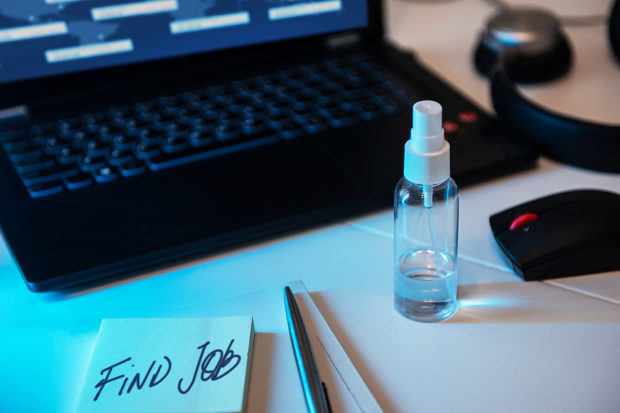Since you asked, we’ll tell you.
Your best talent is sitting at home talking to us—executive recruiting firms. No longer worried about talking to a recruiter at work or checking their personal voicemail at work or checking their personal email at work, your best talent is doing all of that within the confines of their comfy “work-at-home” chair.
We thought you should know.
This great experiment we are living through will have more unintended consequences than the eye can see. One particular unintended consequence that happens to be our business is talent. From the high potentials to senior officers—the questions abound from these cohorts. The main one is, “How do I get promoted?”
Once an easy question and an easy answer: “Be a leader!” However, the world has changed and we’ve been thinking, “How do you ‘be a leader’ these days?” Is leadership different in an office vs. behind a screen with no human interaction? How do you identify “high potentials” or even define the category when you don’t meet and observe them personally? Does merit become purely production- and output-based? Probably not, but you get the point.
Will the pre-COVID culture of a company be different than the post COVID culture? Does a company want and need more of the post-COVID culture than the pre-COVID culture?
Surely the answer must be “yes” post-COVID, but maybe not. How can you define cultural fit when no one works in an office together? How can you build your career from behind a screen? If you are to believe the media, many companies do not anticipate going back to the office until next spring—or maybe never.
There are lots of questions with no real answers. Everyone thinks work-from-home is the new norm. We have our doubts but for reasons you might not think.
Headlines abound with how effective and efficient it is for companies to have their employees working remotely. The tech companies led the charge—most notably Facebook and Twitter—having announced “permanent work from home.” So, your saying ‘but we’re insurance, and we’re different, right?’ Nope. Nationwide has announced it has closed five regional offices.
After months it certainly feels like there is no end in sight to working at home.
Juxtapose the headlines spouting this new world order of no offices with headlines showing survey data that state 40.9 percent of respondents reported one adverse or behavioral health condition—i.e., increases in depression, alcohol and drugs. (Czeisler MÉ , Lane RI, Petrosky E, et al. “Mental Health, Substance Use, and Suicidal Ideation During the COVID-19 Pandemic—United States,” June 24-30, 2020. MMWR Morb Mortal Wkly Rep 2020;69:1049-1057. DOI: http://dx.doi.org/10.15585/mmwr.mm6932a1.) Then further juxtapose that with “Crowds Pack Memorial Day,” “Crowds Pack 4th of July,” “Crowds pack Labor Day.” People are breaking the rules everywhere in order to be together. The reality is that we are all human and need social interaction to survive.
Thinking of social interaction and NYC, remember that it was the city that never sleeps. Everyone in the insurance industry has an office in NYC. You could feel the energy and excitement. That energy and excitement and exposure to leadership is what attracted talent. But have you been there lately? It’s empty.
When it comes to talented employees, they were impatient prior to COVID, and months and months of lockdown has just increased their impatience. This cohort will not stand by idly and wait for their company to figure out how to advance their career. Hence, why we’ve been busier in the last year than we were the year before.
From our perspective, if you’re in the later part of your career, then everything appears to be working just fine—probably even better. Less travel and better quality of life. Why? Your relationships are built. The reinsurance business is a closed loop society based on relationships built over years of trust. Good example, Lloyd’s is working because the networks and relationships are already established.
 Lost in all of the discussion is the next generation of talent. How will they build relationships without joining more senior executives and clients for a meeting that is face-to-face? Meetings—and specifically dinners—are a requisite in insurance. It really doesn’t matter what kind of meeting, if it is internal or with external constituencies: To really get to the root of an issue, you have to gain the confidence of the other party by spending time together.
Lost in all of the discussion is the next generation of talent. How will they build relationships without joining more senior executives and clients for a meeting that is face-to-face? Meetings—and specifically dinners—are a requisite in insurance. It really doesn’t matter what kind of meeting, if it is internal or with external constituencies: To really get to the root of an issue, you have to gain the confidence of the other party by spending time together.
Can Zoom replace building a relationship face-to-face?
Innovation happens by people being together and socializing ideas. Bump into someone in the hallway. Suggest pulling a group together after lunch to discuss a breakthrough idea.
What we’ve learned about talent of all ages is they crave learning and interacting with others. They want to build relationships to foster their careers. Insurance still has an element of apprenticeship. Listen and observe. Join a meeting spontaneously because you might learn something. Learn to read the audience.
This work-from-home keeps the motor running, but at some point you run out of gas. The new relationships aren’t being built, and the old relationships are retiring.
We’re not certain when this will happen and all innovation will stop, but I think talent recognizes this and it’s why they are so frustrated and anxious. Talent is searching for a company that will recognize the work-from-home model in its current form is not sustainable. The company that recognizes this and puts forth creative ideas to get people together and lead will attract the best talent.
So, here’s the punch line: To all the boards and CEOs managing from their second home comfy chairs, your talent is sitting in their comfy chairs too. They are assessing their options for the future. If your company can’t figure out how to keep them engaged, then someone else will. Those companies will be the winners of the future.
We’re almost a year in and not everyone needs to come back. But your talent and future leaders need to see a path forward. The industry’s future will be defined by what you do today, not by spring or summer of 2021.





















 Allianz Built an AI Agent to Train Claims Professionals in Virtual Reality
Allianz Built an AI Agent to Train Claims Professionals in Virtual Reality  Earnings Wrap-Up: AXIS Expanding Insurance Biz, Shrinking Re Book
Earnings Wrap-Up: AXIS Expanding Insurance Biz, Shrinking Re Book  Experts Say It’s Difficult to Tie AI to Layoffs
Experts Say It’s Difficult to Tie AI to Layoffs  Retired NASCAR Driver Greg Biffle Wasn’t Piloting Plane Before Deadly Crash
Retired NASCAR Driver Greg Biffle Wasn’t Piloting Plane Before Deadly Crash 



